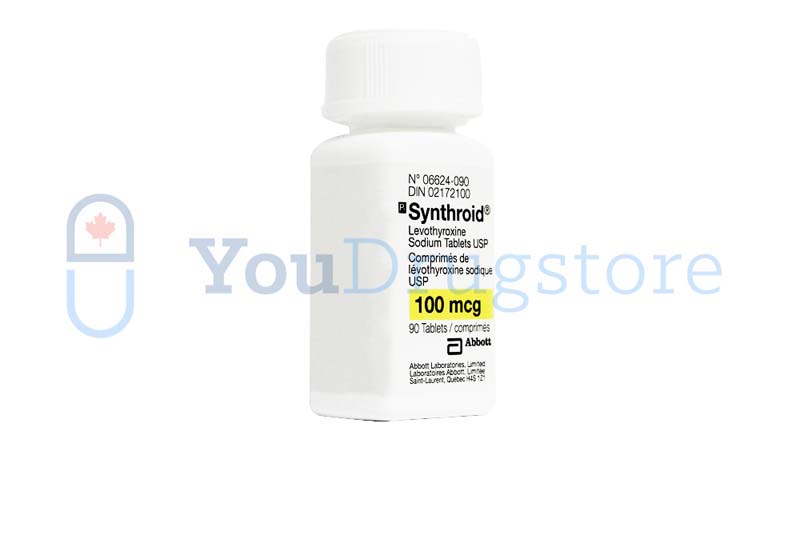

#LEVOTHYROXINE 100 MCG FREE#
Table 2: Drugs That May Alter T 4 and T 3 Serum Transport Without Affecting free T 4 Concentration (Euthyroidism)ĭrugs That May Increase Serum TBG Concentrationĭrugs That May Decrease Serum TBG ConcentrationĬlofibrate Estrogen-containing oral contraceptives Estrogens (oral) Heroin/Methadone 5-Fluorouracil Mitotane TamoxifenĪndrogens/Anabolic Steroids Asparaginase Glucocorticoids Slow-Release Nicotinic Acidĭrugs That May Cause Protein-Binding Site Displacement The protein anabolic effects of thyroid hormones are essential to normal growth and development.

The metabolic actions of thyroid hormones include augmentation of cellular respiration and thermogenesis, as well as metabolism of proteins, carbohydrates and lipids. Thyroid hormones regulate multiple metabolic processes and play an essential role in normal growth and development, and normal maturation of the central nervous system and bone. Some drugs may cause a transient decrease in TSH secretion without hypothyroidism and those drugs (dose) are dopamine (greater than 1 mcg per kg per min), glucocorticoids (hydrocortisone greater than 100 mg per day or equivalent) and octreotide (greater than 100 mcg per day). There are drugs known to affect thyroid hormones and TSH by various mechanisms and those examples are diazepam, ethionamide, lovastatin, metoclopramide, 6-mercaptopurine, nitroprusside, perphenazine, and thiazide diuretics. TSH is used for the diagnosis of hypothyroidism and evaluation of levothyroxine therapy adequacy with other laboratory and clinical data. When thyroid hormone levels decrease, TRH and TSH secretion increases. When serum T 3 and T 4 levels increase, TRH and TSH secretion decrease. Circulating serum T 3 and T 4 levels exert a feedback effect on both TRH and TSH secretion. TSH, in turn, is the physiologic stimulus for the synthesis and secretion of thyroid hormones, T 4 and T 3, by the thyroid gland. Thyrotropin releasing hormone (TRH) released from the hypothalamus stimulates secretion of thyrotropin stimulating hormone (TSH) from the anterior pituitary. Thyroid hormone synthesis and secretion is regulated by the hypothalamic pituitary-thyroid axis. Due to differences in absorption characteristics of patients and the oral levothyroxine product formulations, TSH and thyroid hormone levels should be measured a few weeks after initiating oral levothyroxine and dose adjusted accordingly. Based on medical practice, the relative bioavailability between oral and intravenous administration of Levothyroxine Sodium for Injection is estimated to be from 48 to 74%. Relative bioavailability between Levothyroxine Sodium for Injection and oral levothyroxine products has not been established. For chronic treatment of hypothyroidism, an oral dosage form of levothyroxine should be used to maintain a euthyroid state. Daily administration of Levothyroxine Sodium for Injection should be maintained until the patient is capable of tolerating an oral dose and is clinically stable. Levothyroxine Sodium for Injection produces a gradual increase in the circulating concentrations of the hormone with an approximate half-life of 9 to 10 days in hypothyroid patients.

The age, general physical condition, cardiac risk factors, and clinical severity of myxedema and duration of myxedema symptoms should be considered when determining the starting and maintenance dosages of Levothyroxine Sodium for Injection.
#LEVOTHYROXINE 100 MCG FULL#
* Sections or subsections omitted from the full prescribing information are not listed.Īn initial intravenous loading dose of Levothyroxine Sodium for Injection between 300 to 500 mcg, followed by once daily intravenous maintenance doses between 50 and 100 mcg, should be administered, as clinically indicated, until the patient can tolerate oral therapy. FULL PRESCRIBING INFORMATION: CONTENTS * WARNING: NOT FOR TREATMENT OF OBESITY OR FOR WEIGHT LOSSĢ.2 Dosing in the Elderly and in Patients with Cardiovascular Diseaseĥ.1 Risk of Cardiac Complications in Elderly and in Patients with Cardiovascular Diseaseĥ.2 Need for Concomitant Glucocorticoids and Monitoring for Other Diseases in Patients with Endocrine Disordersĥ.3 Not Indicated for Treatment of ObesityĨ.5 Geriatric Use and Patients with Underlying Cardiovascular Diseaseġ3.1 Carcinogenesis, Mutagenesis, Impairment of Fertility


 0 kommentar(er)
0 kommentar(er)
